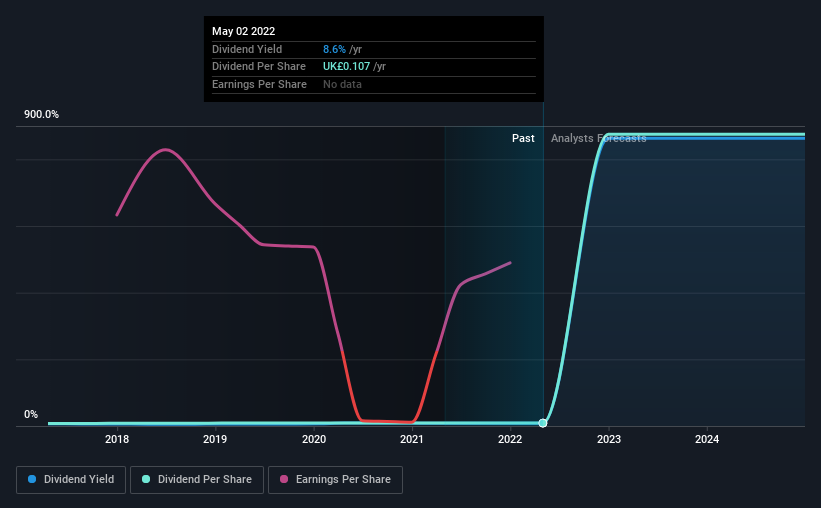We Wouldn't Be Too Quick To Buy EJF Investments Limited (LON:EJFI) Before It Goes Ex-Dividend
Readers hoping to buy EJF Investments Limited (LON:EJFI) for its dividend will need to make their move shortly, as the stock is about to trade ex-dividend. The ex-dividend date occurs one day before the record date which is the day on which shareholders need to be on the company's books in order to receive a dividend. The ex-dividend date is important as the process of settlement involves two full business days. So if you miss that date, you would not show up on the company's books on the record date. Accordingly, EJF Investments investors that purchase the stock on or after the 5th of May will not receive the dividend, which will be paid on the 31st of May.
The company's next dividend payment will be UK£0.027 per share, and in the last 12 months, the company paid a total of UK£0.11 per share. Based on the last year's worth of payments, EJF Investments stock has a trailing yield of around 8.6% on the current share price of £1.24. We love seeing companies pay a dividend, but it's also important to be sure that laying the golden eggs isn't going to kill our golden goose! So we need to investigate whether EJF Investments can afford its dividend, and if the dividend could grow.
See our latest analysis for EJF Investments
Dividends are typically paid from company earnings. If a company pays more in dividends than it earned in profit, then the dividend could be unsustainable. EJF Investments paid out more than half (61%) of its earnings last year, which is a regular payout ratio for most companies.
Companies that pay out less in dividends than they earn in profits generally have more sustainable dividends. The lower the payout ratio, the more wiggle room the business has before it could be forced to cut the dividend.
Click here to see how much of its profit EJF Investments paid out over the last 12 months.
Have Earnings And Dividends Been Growing?
Companies with falling earnings are riskier for dividend shareholders. If business enters a downturn and the dividend is cut, the company could see its value fall precipitously. EJF Investments's earnings per share have fallen at approximately 8.3% a year over the previous five years. When earnings per share fall, the maximum amount of dividends that can be paid also falls.
Another key way to measure a company's dividend prospects is by measuring its historical rate of dividend growth. Since the start of our data, five years ago, EJF Investments has lifted its dividend by approximately 2.2% a year on average. That's interesting, but the combination of a growing dividend despite declining earnings can typically only be achieved by paying out more of the company's profits. This can be valuable for shareholders, but it can't go on forever.
The Bottom Line
Is EJF Investments an attractive dividend stock, or better left on the shelf? Earnings per share have been declining and the company is paying out more than half its profits to shareholders; not an enticing combination. EJF Investments doesn't appear to have a lot going for it, and we're not inclined to take a risk on owning it for the dividend.
With that in mind though, if the poor dividend characteristics of EJF Investments don't faze you, it's worth being mindful of the risks involved with this business. Be aware that EJF Investments is showing 3 warning signs in our investment analysis, and 1 of those makes us a bit uncomfortable...
If you're in the market for strong dividend payers, we recommend checking our selection of top dividend stocks.
Have feedback on this article? Concerned about the content? Get in touch with us directly. Alternatively, email editorial-team (at) simplywallst.com.
This article by Simply Wall St is general in nature. We provide commentary based on historical data and analyst forecasts only using an unbiased methodology and our articles are not intended to be financial advice. It does not constitute a recommendation to buy or sell any stock, and does not take account of your objectives, or your financial situation. We aim to bring you long-term focused analysis driven by fundamental data. Note that our analysis may not factor in the latest price-sensitive company announcements or qualitative material. Simply Wall St has no position in any stocks mentioned.

